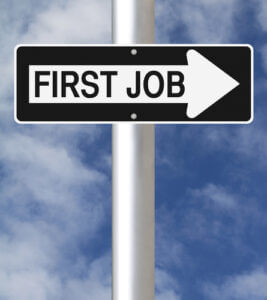Career Advice for Job Seekers
5 Ways to Succeed at Your First Professional Job
Summary: Get the most out of your first professional job by staying in the present, giving your very best effort, and recognizing when it’s time to move on.
As you step into your first professional job, keep in mind that that’s exactly what this is: your first. Of many. And as with so many other aspects of life, there’s only one first. Even if we can’t remember old significant others, past birthdays, or the addresses of the places where we used to live, we all remember our first real job. And most of us are grateful for the lessons we learned and the valuable mistakes we made during that challenging early chapter.
No matter how you feel about the daily tasks you’ll be facing on the first rung of your career ladder, here are five ways to do your future self a favor. Keep these tips in mind and you’ll give older-you a chance to look back on these days with no regrets.
1. Try.
As in, really TRY to do what’s expected of you, plus more. Sure, it’s unreasonable to expect a person to get up this early and work this hard for so little pay. But if you pull back, drag your feet, fight for credit and compensation that you haven’t earned, or pat yourself on the back for easy accomplishments and expect others to do the same, you’ll miss an opportunity to test your limits by pushing yourself against them.
And here’s a secret: you won’t be able to push yourself against these limits forever. As you get older, it becomes harder to care about the daily details that separate mediocre employees from great ones.
2. If you have an idea that might benefit the company (or its employees), speak up.
You’ll be glad you did. Don’t be afraid that you’ll be laughed at or silenced. At this early stage, professional embarrassments are like falling from a very low ledge. Young people face a modest bar of expectations, which means they’re forgiven for taking risks, speaking up, and getting things wrong. Use this immunity while you have it.
3. Don’t overestimate the impact of this job on your lifelong career.
This job may seem like the world to you right now. It may feel like your entire value as a person begins and ends with your boss’s praise and criticism. But most of us look back on our first professional jobs and laugh at how irrelevant they now seem to our career paths as a whole.
4. Learn.
Use every moment as a learning opportunity, and try to view every drama and setback as an adventure. Today’s painful moments are tomorrow’s great stories.
5. Leave when it’s time.
First jobs don’t last forever. Ideally, they shouldn’t last more than three years. If you’ve given this company your best effort and you’ve gotten everything you need from this experience, it’s time to move on—especially if the company isn’t taking you where you need to go. Don’t request a promotion or raise more than twice. If you’re rejected the first time, ask what you need to do to improve, do your best to take this advice, then ask again. If you’re told no a second time, say goodbye and find work elsewhere.
LiveCareer (www.livecareer.com), home to America’s #1 Resume Builder, connects job seekers of all experience levels and career categories to all the tools, resources and insider tips needed to win the job. Find LiveCareer on Youtube and visit LiveCareer’s Google+ page for even more tips and advice on all things career and resume-related.
New Job Postings
Advanced Search